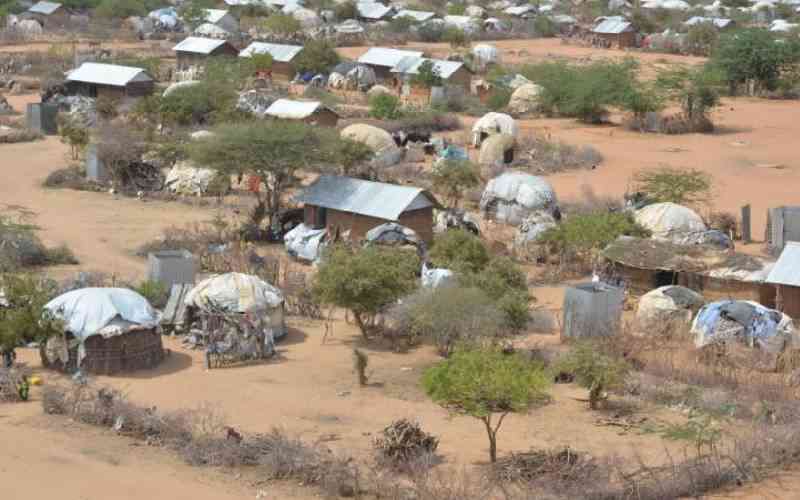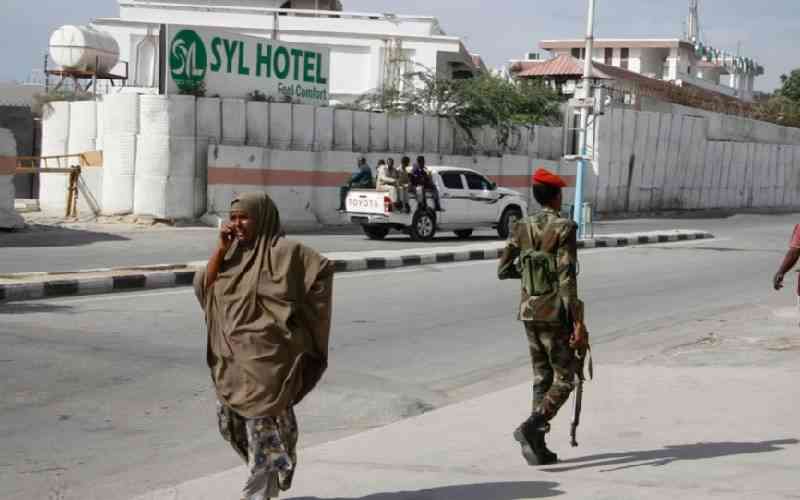By Jacob Ng’etich
[email protected]
Garissa, Kenya: Dadaab Refugee Camp is arguably the biggest refugee camp in the world. The complex that sits a few kilometres from the Kenya-Somalia border has been in the news lately for all the wrong reasons.
Barely a month ago, the famous camp was in the spotlight when it emerged terrorists who attacked the Westgate Mall killing some 67 people was living in the camp, and had hired a chopper from there on the day of the attack.
The local community is also uncomfortable with the ‘visitors’ who have taken over business opportunities, grazing fields and land from the residents and have allegedly defiled the environment.
Slow business
Mr Abdi Hussein defies the scorching sun outside his small shop in Hagadera as he awaits for the next customer to come calling. The last time he sold some stock in the busy refugee camp is two hours ago, not that the day is any different from the others; he is used to buyers coming in sporadically.
Hussein 56, is unsure whether to continue with the business that has been trudging along or tend to his dwindling livestock due to many animals with little grazing land to cater them. The father of nine is victim of an increasing estranged relationship between the refugees and the locals, characterised by cutthroat competition for business and livestock grazing field. This situation was first created in the early 1990s, but has seen an influx.
“These people since they came, they have only made our lives from bad to worse, we are not benefitting from their presence here as expected, instead our lives are deteriorating while they are flourishing,” says Hussein.
He said that hardly do refugees come to his shop for anything and would only do so if what they wanted was not in a number of shops around them.
“We are all Somalis but these refugees segregate, they are very good at that: they only come to buy from you if they must, otherwise they buy from their fellow refugees. This has killed the locals’ businesses,” he said. Abdul Kikuyu, a bus conductor explained that the relationship between the locals and the refugees was not good because the Somalis had taken over every bit of business operations in the town.
“The refugees do not feel free interacting with the locals, they want to run their businesses but do not want to see the indigenous people flourish. They have in some cases attacked them, there is bad blood
between us and them because they want to control the area despite the fact that they found us here,” said Mr Kikuyu.
Comparative advantage
A year ago, a car belonging to a local was set ablaze by the refugees under mysterious circumstances, however, Hussein blames it on the business rivalry between refugees and the residents of the region. “It later emerged that some refugees did not feel comfortable with the locals doing genuine business,” said Hussein.
Stay informed. Subscribe to our newsletter
The shopkeeper said most of the refugees had comparative advantage because they trade in smuggled goods, including sugar from Somalia. “These refugee businessmen are selling smuggled stuff, sugar and other essentials commodities from Somali, and they do not fear arrests. The United Nations High Commissioner for Refugees (UNHCR) and the other implementing agencies guys would be very quick to take actions to ensure that whoever is arrested is released while the locals remain,” said Kikuyu.
According to a UNHCR official, there are over 4,500 small businesses that include telephone bureaus, shops, hotels, electricity suppliers, Internet cafes, grocers butcheries, barbershops, clinics and matatus run by refugees in the complex. A report by 2010 Kenyan government together Norway and Denmark found
that refugee-run businesses in Dadaab camps bring in annual revenue of about 2 billion shillings. The study dubbed, In search of protection and livelihoods: Socio-economic and environmental impacts of Dadaab refugee camps on host communities, noted that on livestock and milk sales in the camps, the country annually earns about Sh250 million.
According to the study report, the trade benefitted the local community and represents an estimated 25 per cent of average annual per capita income in the entire region with the three counties of Wajir, Mandera and the host Garissa.
“The fact that we are refugees does not stop us from being people who are capable of doing something, we cannot be idle and wait for the UN to supply us with their rations when we have the strength to do something,” said 42-year-old wholesale and retail businessman Ahmed Dire.
He said that for the last seven years he has worked hard to build his business from the Sh12,000 he got from his brother abroad to where it is with a stock of close to a million shillings.
No opportunities
“It is not fair for the locals to say that we are frustrating them. We are competing and if you get more customers, that is your luck, there is nothing we get for free from UNHCR and their implementing agencies. Apart from the food ration, we struggle like any other person,” said Mr Dire.
But according to Salah Yakub Farah, County Executive for Energy, Environment, Natural Resources and Tourism, there were expectations that by hosting the refugees it would benefit the locals. However, the story is not true. “Our people have only lost, they are gaining nothing from unfair business competition and destruction of environment which is a major concern.
The activity of refugees shelter and sources of energy and livelihood all depend on the already overburdened environment,” said Mr Salah.
He added: “The region is not only providing refuge for the people from Somali, the refugees own camel, goat, sheep and cattle more that the host community, meaning that the Arid and semi Lands region which has a fragile ecosystem is stressed,” said Salah.
Shukran Gure, Women Representative Garissa County lamented that the local people had not benefitted from the jobs in the camps despite their generosity to the refugees.
“The UNHCR and its implementing agencies has not given opportunities to the local people, though the residents welcomed the refugees and accommodated them,” said Ms Gure.
 The Standard Group Plc is a
multi-media organization with investments in media platforms spanning newspaper
print operations, television, radio broadcasting, digital and online services. The
Standard Group is recognized as a leading multi-media house in Kenya with a key
influence in matters of national and international interest.
The Standard Group Plc is a
multi-media organization with investments in media platforms spanning newspaper
print operations, television, radio broadcasting, digital and online services. The
Standard Group is recognized as a leading multi-media house in Kenya with a key
influence in matters of national and international interest.
 The Standard Group Plc is a
multi-media organization with investments in media platforms spanning newspaper
print operations, television, radio broadcasting, digital and online services. The
Standard Group is recognized as a leading multi-media house in Kenya with a key
influence in matters of national and international interest.
The Standard Group Plc is a
multi-media organization with investments in media platforms spanning newspaper
print operations, television, radio broadcasting, digital and online services. The
Standard Group is recognized as a leading multi-media house in Kenya with a key
influence in matters of national and international interest.







